VOLUME 62, NO. 6
RUNNING THE RACE
A MEANINGFUL CONTRIBUTION
MORE THAN A SCHOLARSHIP
Digest
JUNE 2023
MBHERALD.COM
More than sixty years of sharing the life & story of the Mennonite Brethren in Canada
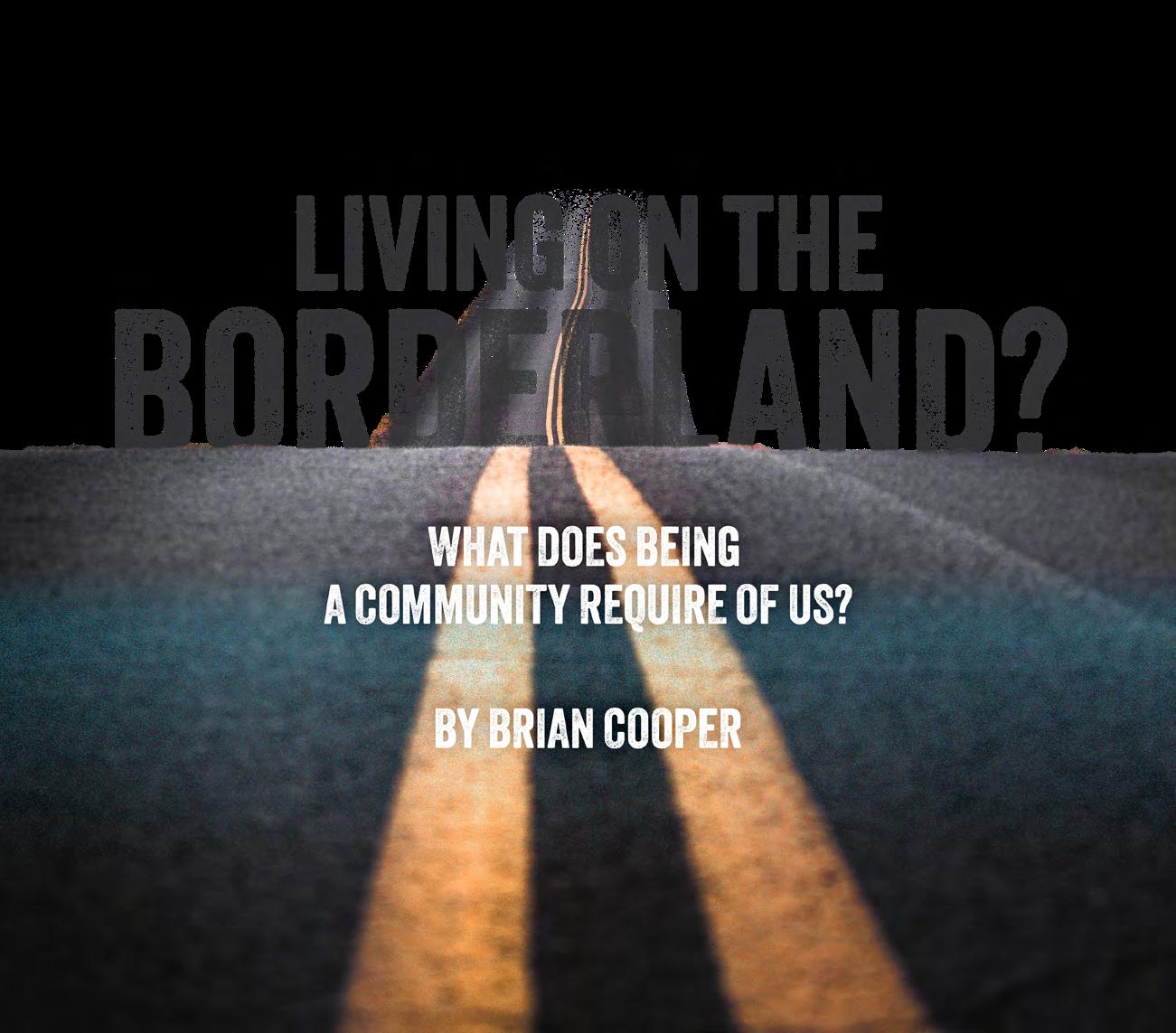
Q: How do you speak well about marriage with your neighbours, knowing that marriage can be difficult?
A: Check out the Faith and Life online pamphlets about marriage and family. www.mennonitebrethren.ca/ nflt-resources

NATIONAL FAITH AND LIFE TEAM
Mennonite Brethren Herald Digest is digitally published monthly by the Canadian Conference of Mennonite Brethren Churches, primarily for the use of its members, to build a Canadian MB community of faith. We seek to 1) share the life and story of the church by nurturing relationships among members and engaging in dialogue and reflection; 2) teach and equip for ministry by reflecting MB theology, values, and heritage, and by sharing the good news; 3) enable communication by serving conference ministries and informing our members about the church and the world. However, the opinions expressed here are not necessarily those of the church as a whole.
Digest
JUNE, 2023 | VOLUME 62, NO. 6
EDITORIAL OFFICE
1310 Taylor Avenue
Winnipeg, Manitoba R3M 3Z6
Phone: 204-669-6575
Toll-free in Canada: 888-669-6575
MBHERALD@MBCHURCHES.CA
WWW.MBHERALD.COM
ISSN: 0025-9349
The Mennonite Brethren Herald is a publication of
3 6
“CCMBC national director Elton DaSilva teaches during the International Community of MB Churches' (ICOMB) Summit in Abbotsford, BC.

Read Nikki White's event summary on page 10.
Sharing the life and story of Mennonite Brethren in Canada
10
RUNNING THE RACE
Nikki White
19
MORE THAN A SCHOLARSHIP MB Seminary
1 MENNONITE BRETHREN HERALD JUNE 2023
CCMBC STAFF UPDATE CCMBC Executive Board
Q&R CORNER Ken Esau
FACEBOOK.COM/MBHERALD TWITTER.COM/MB_HERALD SOUNDCLOUD.COM/MBHERALD MBHERALD.COM Connect
CANADIAN CONFERENCE OF MENNONITE BRETHREN CHURCHES CONFÉRENCE DES ÉGLISE DES FRÈRES MENNONITES
From the editor
For by the grace given me I say to every one of you: Do not think of yourself more highly than you ought, but rather think of yourself with sober judgment, in accordance with the faith God has distributed to each of you.
Romans 12:3
The winter wren is a tiny bird, weighing only half an ounce and with a wingspan of 5-6 inches. It has a small plump body and a short neck. It looks like a little brown ball with a tail. While it may not appear majestic, the winter wren delivers its song with ten times more power per unit weight than a rooster. Not bad, huh?
While the rooster may strut around with its feathers puffed up, the wren quietly goes about its business, flitting from branch to branch in search of food and nesting materials. Its small size and unassuming plumage make it easy to overlook, but its cheerful song and energetic movements are a delight to watch.
Most days, I’d rather be a rooster than a wren. Who wouldn’t? I’ve been short in stature my entire life, always the smallest in the class. I want to be the rooster for once—just once. However, Scripture tells us to be humble before God and others, so I’ve learned to accept my place with gratitude. Christ has given me a purpose and forgiven my sins, pride, and selfishness. Now, I can serve Him in ways that make a significant impact.
Sharon Simpson makes a significant impact in her workplace and as BCMB’s moderator by working behind the scenes, away from the spotlight. “I’ve just asked God that I could be faithful with what he’s given me and that I would be faithful to him and let it land where it lands,” Sharon says. Read Sharon’s story “A meaningful contribution” on page 19.
The MB Church needs more leaders like Sharon. We find ourselves at a turning point as older pastors retire and leave their posts; we need an influx of new leaders. Keith Reed of MB Seminary unpacks our new Leadership Development Partnership Grant on page 2 2 . As you identify potential leaders in your community, consider mentioning the grant or directing them toward the Seminary for support.
As always, I urge you to read every article in this month’s Digest. We cover a lot of ground in the June issue; I couldn’t cover it all in these few lines. I thank our contributors for what they do and for their voices. I thank our advertisers and supporters, and I thank you, reader.
With respect, Carson
CARSON SAMSON Communications director

2 MBHERALD.COM JUNE 2023

3 MENNONITE BRETHREN HERALD JUNE 2023
Dear CCMBC church family,
With mixed emotions, we share the news of Elton DaSilva’s resignation from the CCMBC National Director role. While we are sad to see him go, we are pleased to hear that he has accepted the invitation to join the International Community of Mennonite Brethren as their General Director. We wish him wisdom and discernment in his new role.
Elton has done a remarkable job of championing and leading the Collaborative Model that now governs us and has guided the Collaborative Unified Strategic Plan (CUSP) that provides guidance and direction for our future.
Thanks to his leadership, we’ve moved forward as a denomination with a sharper vision for what God has called us to be and do in building his kingdom in Canada, following our principle value of Scriptural authority.
We will miss Elton and look forward to seeing the great work he will contribute to his new position in our global family. He will continue to serve as CCMBC National Director until October 31, 2023.
The Executive Board is working with Elton to provide a smooth transition to a new National Director. Over the next month, the Executive Board will begin reviewing the job description and formulating a profile for a new hire. We invite you to join us in prayer through this transition time.
If you have questions, please contact us at communications@mbchurches.ca
Trusting God’s infinite grace,
Cam Stuart (D Min.)
CCMBC Interim Executive Board Moderator
4 MBHERALD.COM JUNE 2023
CANADIAN CONFERENCE OF MENNONITE BRETHREN CHURCHES
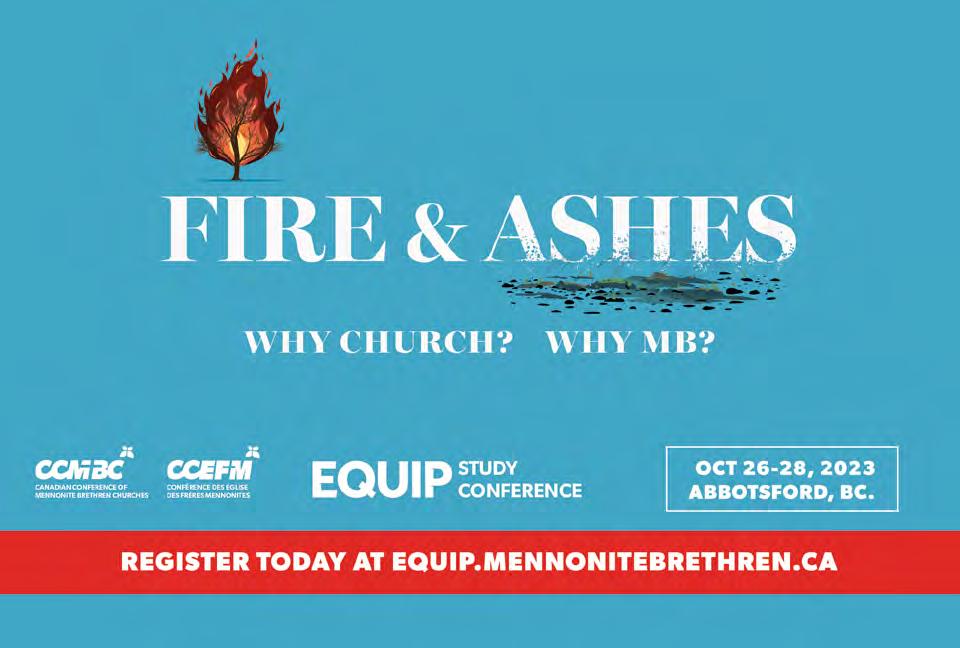

5 MENNONITE BRETHREN HERALD JUNE 2023 You can now earn 5.40%* on your RRSP, TFSA or Cash Account with CCMBC Investments *per annum. Rate in effect January 1, 2023 to June 30, 2023. Subject to change. CCMBC Investments offers RRSP/ RRIF’s, TFSA’s and Cash Accounts. When you invest with CCMBC Investments, you get: • Competitive and steady interest rates • No fees • No terms (not locked-in) • Faith-based investing www.ccmbclegacyfund.com INVESTING IN KINGDOM GROWTH TOGETHER 1-877-437-7103 (mention: “CCMBC”) capstoneassets.ca ccmbc@capstoneassets.ca Disclaimer: The information contained herein is for informational purposes only and is not an offer to sell or a solicitation of an offer to buy any securities in any province of Canada, and may not be relied upon in connection with the purchase or sale of any securities. If you are interested in investing in CCMBC Investments Ltd. please contact Capstone Asset Management at 1-855-437-7103 or ccmbc@capstoneassets.ca. To make an investment or to open a new account, please contact:
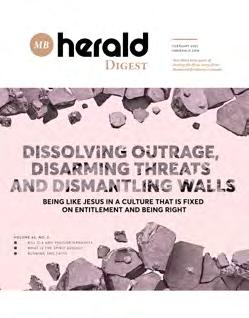
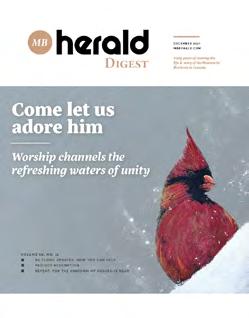




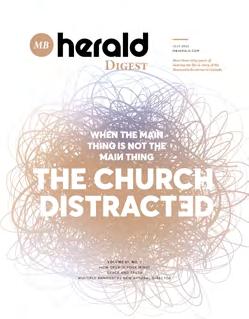
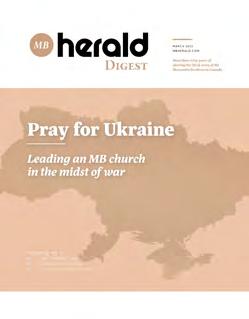



SHARE THE MB HERALD DIGEST WITH YOUR FRIENDS SIGN UP FOR THE MB HERALD DIGEST AT MBHERALD.COM/SUBSCRIBE OR CONTACT US AT (888) 669-6575 MBHERALD@MBCHURCHES.CA THINGS ARE BETTER WHEN THEY’RE SHARED
Q&R corner
Q&R corner provides responses to questions that readers may have about CCMBC and its work collaborating with provincial MB conferences in areas of spiritual health and theology, leadership development, mission, and organizational health in order to achieve the overall mission: “To cultivate a community and culture of healthy disciple-making churches and ministries, faithfully joining Jesus in his mission.” If you would like to contribute a question, please send it to questions@mbchurches.ca
Please note that we will not be using your name in the MB Herald Digest in order to respect those who prefer anonymity. There may not be space to respond to every question—and sometimes we might not really have the ability or authority to respond to some questions (for example, those that relate more directly to one of our provincial MB conferences or to a local church leadership). We apologize in advance if we are unable to publish a response to your specific question.
(Note: We did not receive this question directly from one person, but it is a summary of questions that were received by several of our provincial conference leaders.)
The Fall 2022 issue of Direction describes a national study that brings up some very challenging conclusions related to how pastors and churches presently view and use our MB Confession of Faith. There are a number of responses to the study but no response from our national leaders.
What is your response to this study and to the Fall issue?
THANKS FOR YOUR QUESTION. Unfortunately, while some of us were invited to publish a response, the timeline didn’t work. Before I try to respond to the study itself, I should make some comments about Direction, since many of our readers may not know much about it. Direction began in 1972 and has been publishing in print (and more recently online as well) since then. All back issues are available here. The stated purpose of the journal is the following:
Direction seeks to serve the Mennonite Brethren constituency but also the wider religious scholarly community. It provides a forum for addressing biblical, theological, ethical, pastoral, educational, and evangelistic concerns, from international as well as from local perspectives. It seeks to play a role complementary to, but distinct from, both scholarly journals
of a technical nature and denominational periodicals. Published twice a year (approx. 100 pages per issue), its intended audience includes educators, pastors, conference leaders, and informed church members.
Direction is a collaborative effort between five MB schools (MB Biblical Seminary, FPU/FP Biblical Seminary, Tabor College, Columbia Bible College, and CMU) along with the CCMBC and USMB Executive Boards (although these boards have not had any role in its selection of writers, topics, or overall operation). Direction is not a publicity piece or a denominational periodical but a “forum” which means that it will include a variety of perspectives on topics—even perspectives we may not agree with or promote at CCMBC.
The Fall 2022 issue of Direction is dedicated to reporting on the “Using the Confession of Faith” study.
SPIRITUAL HEALTH AND THEOLOGY 7 MENNONITE BRETHREN HERALD JUNE 2023
This “community-based research study” was overseen by Rich Janzen and Brad Sumner, funded by the MB Historical Commission through a grant, and described as a “unique opportunity to listen to in-depth interviews with pastors as they offer their perspectives about an integral aspect of the MB family” (140). The study methodology involved “seventeen in-depth, individual telephone interviews…with [Canadian] MB pastors purposively sampled to ensure a range of perspectives” (144). These “pastor-to-pastor interviews” (144) were done by “peer researchers (mostly MB pastors trained by CCMBR [Rich Janzen’s Centre for Community Based Research])” (144) allowing for “free-flowing, open conversation” (145). The study findings highlighted that “congregants are generally limited in their familiarity with the Confession of Faith” (145) and that “the Confession of Faith typically operates in the background of congregational life, only occasionally appearing in the foreground” (146).
When it came to specific questions of the Confession of Faith impacting MB identity, biblical interpretation, and discipleship, the study highlights a lack of consensus on these questions: “An overarching theme across the interviews was the diversity of perspectives on the use of the Confession of Faith in MB congregations” (154). The feature article explains that LGBTQ+ issues (Article 11), Love and Nonresistance (Article 13), and Christian Baptism (Article 8) were the topics “that created the most inquiry, friction, and disagreement” (154). The feature article also summarizes how these seventeen pastors described their congregations’ approaches to maintaining unity within diversity of perspectives in “confessional thinking and acting” (156).
I would hope that our first response to any research study done on our MB church family would involve both thankfulness and curiosity. We have been gifted with some information that could help us understand our pastors better and by extension our churches. But we have also been given some troubling data that should spark curiosity. How did we get to the point where these pastors (and some of the responders in their published articles) express such diversity—and at times such a discouraging perspective on our Confession of Faith?
But beyond that, we also need to ask questions about the study in terms of its methodology and conclusions. The study purports to give us a troubling “diagnosis” related to our MB family. While the diagnosis might be correct, we should ask whether the study is solid enough to support it? We have also been given a suggested “treatment plan” in light of the troubling diagnosis. Again both might be true, but I would have some cautions before we embrace either conclusion.
After interviewing seventeen MB pastors, Janzen and Sumner provide us with a troubling diagnosis:
I would hope that our first response to any research study done on our MB church family would involve both thankfulness and curiosity. We have been gifted with some information that could help us understand our pastors better and by extension our churches. But we have also been given some troubling data that should spark curiosity.
“The range of pastoral perspectives demonstrates that congregations have no uniform way of thinking about or acting out the Confession of Faith” (157; emphasis added).
First, it is a little surprising that the authors would make this generalized and conclusive statement about MB “congregations” since the study only interviewed seventeen individual pastors from seventeen congregations (out of the 230-plus MB congregations in Canada). This seems like a very small sample size upon which to make such a claim.
Second, this is a puzzling statement since Janzen and Sumner themselves recognize at the beginning of their article “that the findings are not representative of, and cannot be generalized to, all Canadian MB congregations” (145). It feels, however, that their conclusion about “congregations” is attempting to do exactly that.
Third, finding a lack of uniformity among the seventeen interviewed pastors should come as no surprise since the study deliberately selected pastors to “ensure a range of perspectives” (144). If diverse pastors were interviewed, then we should expect that the study would find diversity in their reporting of how the Confession is thought about and acted out. What the study shows is that when we begin with a deliberately chosen diverse research group and interview them, we will discover that they express diverse views. Should that surprise us?
Fourth, it is hard to know exactly what “uniformity” around the Confession of Faith would even look like. Many MB pastors and church leaders may well preach and teach in a way consistent with the Confession, yet they may rarely mention the Confession. The Confession is our summary of what the Bible teaches— so it is not intended to be the focus of preaching/
8 MBHERALD.COM JUNE 2023 SPIRITUAL HEALTH AND THEOLOGY
“ ”
teaching in the local church. It is very possible that there will be significant variety between how pastors and churches engage with the Confession but this itself may not be that troubling as long as there is agreement around what the Bible teaches in the areas of theological/ethical convictions. We might do well to engage this question more directly.
Fifth, it is surprising as well that the seventeen pastors were interviewed by other MB pastors/leaders whom they likely knew. While I certainly can’t say for sure if this affected individual responders and/or the way the “free-flowing, open conversation[s]” (145) were conducted and recorded, it seems that having neutral and unknown interviewers would have lessened the various forms of bias possible by both the responder and the interviewer.
Then when it comes to the treatment plan, Janzen and Sumner write that their study could help denominational leaders in “exploring how MBs can learn to live with diversity and difference” (157; emphasis added). The study did ask the seventeen pastors practical questions about how they have tried to deal with diversity within their own congregations but the study itself was not focused on the best way to respond to diversity within a group.
I don’t want to misread Janzen and Sumner’s article, but it feels like readers were supposed to leave with these two takeaways: 1) Canadian MB congregations have very significant (likely irreconcilable) theological/ethical diversity in relation to the MB Confession of Faith AND 2) in light of this news, the best response from denominational leadership would be to stop opposing this diversity and rather learn to live with it.
There are a variety of helpful and not so helpful approaches that leaders can take in response to fundamental diversity that threatens the unity of an affinity group like a denomination. When a sports team discovers significant diversity in relation to its goals, core values, and strategies, the coaches may decide to simply accept or even celebrate that diversity, or they may decide that at some point the diversity actually undermines their shared purpose and effective mission as a team. Some individual members may be asked to move closer toward the team. The coaches may also re-invest energy in team-building strategies to call the team back so they can pull together in the same direction.
The Janzen and Sumner study invites us toward curiosity about responding to diversity. What actually is the level of theological/ethical diversity that exists firstly among our pastors/leaders and then secondarily among those who claim “membership” within our local churches? And what should be our provincial and national leadership response to whatever level of diversity we discover? Is there a time when a church family
should call family members (viz. pastors and churches) back toward its shared mission, vision, and theological/ethical convictions? What kind of team-building activities would bless our larger church family? The present study encourages us to ask key questions about our shared theological/ethical convictions and how they relate to our identity as a church family.
But your question was not only about the study but about the responses that were published in the Fall 2022 issue. Since Direction is not a denominational publicity piece but a “forum,” a disclaimer should probably be included—“the opinions expressed here do not necessarily reflect the views of CCMBC or USMB leadership.” Three of the first four writers appear to accept both the diagnosis of significant diversity and the treatment plan of living with (or even celebrating) theological/ethical diversity. Here are a few quotations from these writers:
Lynn Jost: “Belonging is enhanced by the expansion of diversity” (168). “I propose retiring the 1999 Confession and replacing it with a simple statement of faith that more closely resembles the church’s first confession, ‘Jesus is Lord’” (169). “Because Jesus welcomes all to the table, so must we” (170).
Lee Kosa: “…given the biblical precedent for renegotiating longstanding identity markers and the miracle of mutually expansive identity that can take place through the joining of difference in the body of Christ, MBs can welcome this renegotiation as an opportunity to discern the Spirit’s wild and enriching work among us” (178).
Paul Doerksen: “The role of faithful openness here is ignored at our spiritual peril; when our shared Confession is used as a tool of containment, of suppression or sincere inquiry, even—God forbid—of blatant oppression, then we know that we no longer are practicing the act and event of confession as a shared cry of acknowledgment. Confession understood and practiced as engagement with
SPIRITUAL HEALTH AND THEOLOGY 9 MENNONITE BRETHREN HERALD JUNE 2023
“ ”
The Confession is our summary of what the Bible teaches—so it is not intended to be the focus of preaching/teaching in the local church.
The Janzen and Sumner study invites us toward curiosity about responding to diversity. What actually is the level of theological/ethical diversity that exists firstly among our pastors/leaders and then secondarily among those who claim “membership” within our local churches?
God can help us resist the temptation to lock down our Confession to introduce (false) stability and forestall perceived crises” (185).
While there is no space here to debate their suggested actions, these responses should provoke our curiosity. What kind of church do these writers want our MB family to look like? What types of diversity are they advocating for and suggesting would be enriching and enhancing for our family? (Certainly not all types of diversity would move us in that direction.) Would there even be an CCMB family long term if these suggestions were embraced? While maintaining a denominational family is not my highest priority if what replaces it is more faithful to Jesus and the Kingdom, I have significant hesitations that these suggestions would produce that result.
What do we plan to do next?
We (as in our CCMBC office and the NFLT) want to be open to learning what we can from the study and from this issue of Direction. Even though we may have methodological questions about the study itself (as well as other questions related to the final shape of the Fall 2022 issue), we have been provoked to reflect more carefully on the questions and suggestions raised. There is a level of honesty in this issue that allows us to hear things more loudly than we otherwise might. So what are we doing?
˚ We have been motivated to revise the 2018 “Nature and Function of the Confession” into the new “Introduction to the MB Confession of Faith” (2023) available here. We believe that this revised document addresses some key questions and invites our larger family into a more positive understanding of the purpose of our
Confession. We are also updating the resources connected to our Confession of Faith. For a sample from “Article 1: God” follow the link here; for Article 8: Baptism follow the link here
˚ Because of some of the feedback contained in the study and from respondents, we are proposing a restructuring of the CCMBC Ministry Credentialing Questionnaire to promote a greater engagement with our Confession of Faith. We believe that our MB Confession is a valued treasure that has been misunderstood and underappreciated. Any comparison of our Confession to a cell phone contract (pp. 147; 190) should lead us to reflect more carefully on how we have gotten to this point.
˚ Listening to these voices has caused us to increase engagement with the MB Confession of Faith in the MB Herald and through structured events like the Pastoral Credentialing Orientation and our Equip conferences.
˚ We also want to work more on team-building activities that invite our leaders and churches into our shared Kingdom vision and mission, centred on Jesus, and faithful to the vision of the biblical writers. Any team without a compelling and widely shared vision will have no other option than to live with a crippling diversity pulling it in conflicting directions. Let’s hope that is not our future.
Thanks for your question. I hope that this response is helpful.
Ken Esau (National Faith & Life Director)
10 MBHERALD.COM JUNE 2023 SPIRITUAL HEALTH AND THEOLOGY
“ ”
RUNNING THE RACE
ICOMB 2023 SUMMIT REPORT
BY NIKKI WHITE
This year’s summit of the International Community of Mennonite Brethren Churches (ICOMB), hosted in Abbotsford, BC, provided delegates a unique opportunity to experience the rich MB heritage in that region of Canada. With churches dating back to 1929, a Bible College founded in 1943, and a historic Mennonite Heritage Museum with exhibits spanning 500 years of Anabaptist history, there was a palpable sense of being surrounded by “a great cloud of witnesses” encouraging believers to “ throw off everything that hinders and the sin that so easily entangles” and “run with perseverance the race marked out for us…” (Hebrews 12:1).
Running has not been easy this last year.
As global MB pastors and leaders are aging out, they are looking to pass the baton to the next generation without slackening their pace. However, with fewer and fewer young leaders stepping up, that pace can be exhausting. In some cases, a lack of prospective leaders is exacerbated by the loss of existing church pastors who–emotionally depleted by three years of social unrest, political instability, financial hardship, culture wars, gender issues and COVID-19 devastation–simply quit.
“The pastor is expected to be everything, fix everything,” one delegate remarked wryly. “Then,
when something goes wrong, we are blamed for everything!”
“I am old, ready to retire,” another shared. “But if one of our churches loses its pastor, what else can I do but step in?” This was a common sentiment spoken by many, including delegates from Japan, Lithuania, Germany, Portugal, the US and Canada. This race is no sprint; it is a marathon, and some have grown weary.
USMB National Director Don Morris reflected, “We are engaged in a critical battle here, one that has eternal ramifications. This summit is a mixture of joy and sadness, abundant fruit and scarcity, praise and petition. But,” he pointed out, “we cannot afford to get too focused on our own little part of God’s kingdom work and forget that there are movements happening in many, many places.” Raw self-examination and assessment must lead, not to despair, but to a rolling up of metaphorical sleeves. And so, despite the gravity of the concerns expressed, faces were far from grim. Rather, they grew animated and eager.

There was work to be done.
The sheer grit of these global leaders–some of whom face significant religious persecution in their countries of origin–is extraordinary. With a spiritual resolve that did credit to the ancestral brethren that had once plowed the very ground upon which they now stood, delegates dismissed from the plenary sessions headed to their workshops ready to explore new ideas, ruthlessly self-evaluate, strategize together and pray outrageous prayers. Each workshop was targeted, provoking spirited conversations on topics such as leadership development, pastoral health, and collaboration. Ideas came thick and fast as various
MISSION 11 MENNONITE BRETHREN HERALD JUNE 2023
Rudi Plett, the general director of ICOMB, had his feet washed. He will be stepping down as the leader of ICOMB in 2024.

Previous page: Delegates pray for one another.
to fill it with supplies and drive it to Ukraine. Now, that van is being used daily by our brothers there, transporting refugees and bringing emergency relief.” Out of the ashes, beauty.
Other groups focused on the issue of pastors facing burn-out. How could a conference stem the tide of leaders leaving the ministry? In Brazil, small, intentional support groups have helped over 400 pastors regain emotional and spiritual health, while training them to do the same for their own congregants.
models for church growth and health were discussed.
“In Saskatchewan, rural churches are dying,” shared a provincial conference representative, “but instead of shutting them down, we are finding ways to re-plant them.” He went on to describe an SKMB church revitalization initiative that connects struggling churches with healthy partner churches, working together to discern the spiritual vitality and cultural issues that need to be addressed in order to thrive again. “It takes time,” he admitted, “a lot of time. Not all churches can devote the three to five years needed to re-plant, but we are seeing some significant results in remote rural communities.” Could this strategy work in other global contexts? It could. Hope blazed like a proverbial prairie fire.
Would such a partnership be too costly? There was much debate about the risks involved. Pondering the Parable of the Talents, there was a realization that risk taken for God would always bear fruit, but it might not be the fruit that benefits us personally. “One of our churches was not doing well,” an Austrian delegate shared. “They had a large cargo van. It was no longer being used, since there were no people to fill it anymore! But rather than sell it to help with debt, they decided
“New leaders are now stepping up,” said Paul Dück, “when they see how we care for one another.” No one, it was said firmly, should have to run this race alone. Then there were stories of those who were running together, and are running well. In Malawi, conference leader Safari Mutabeshi passed his role to Shadreck Kwendanyama and team, leaving Safari free to focus more on DR Congo, his place of origin. “Despite drought, famine, hurricanes, cholera and poverty,” Safari said, “the churches are growing, with over 20,000 attending in Malawi!” In similar fashion, the Brazilian conference agreed to come alongside the conference in Angola, supporting Daniel Canganguela in discerning next steps. And in the US, twelve churches of Congolese immigrants were welcomed into the MB family, with more being discerned. Collaboration was crucial.
A collaborative approach to church growth involves, for some, “revitalization” through a strong partner church. For others, it is a “coalition partnership” between a global church, a national leader and a North American church. For still others, church growth may require several groups of partner churches, called “sponsors.” Victor Wiens, Equipping Coordinator for ICOMB, told of the encouraging but daunting number of emerging church networks expressing interest in joining the global MB family, including groups from Bolivia, Dominican Republic, Kyrgyzstan, Mozambique, North Africa, Turkey, Sri Lanka, Uganda and Myanmar.
“These are new groups that have come into our orbit in one way or another,” Vic shared, “and are seeking support. We have had a good system in place whereby newcomers to the ICOMB family are accompanied by sponsors who coach them. Multipy has filled this role up till now, but we need a lot more sponsors.”
Vic went on to propose that smaller groupings of churches (regional conferences, ethnic associations, etc.) be authorized and blessed to serve as sponsors for these fledgling groups that are seeking to join the MB family.
“Pace is critically important,” Rudi Plett said. “In some places we are stuck, but in others we are changing much too quickly. Mission needs to move at a pace which churches and conferences can sustain, or they will burn out.” Change is both disruptive and inevitable; it must also be intentional and measured.
12 MBHERALD.COM JUNE 2023
Change also took place during the summit at the executive level, as a new board was put forward for the next term. Executive Director Rudi Plett, having completed six years of service from his base in Paraguay, also formally proposed Canadian conference minister Elton DaSilva as his successor. This was met with overwhelming approval, and Elton has since agreed to accept this role.
Due to difficulties in obtaining Canadian entry visas, various global delegates were unable to attend the summit in person, but made their presence felt via video conferencing. These were poignant moments, where their physical absence was keenly felt by all. Expressions of brotherly affection–both in person and virtual– increased throughout the week, as new commonalities of


blessing and challenge were discovered almost daily. There were times when these discoveries left attendees raw and vulnerable, as faults were acknowledged, and apologies received, but this is what it means to be family.











The ICOMB 2023 summit was a gathering of siblings. In humility they gathered to turn their gazes inward in honest self-examination, outward in grace and good will, and upward in faith-filled prayer, with fresh vision and resolve for the year to come.
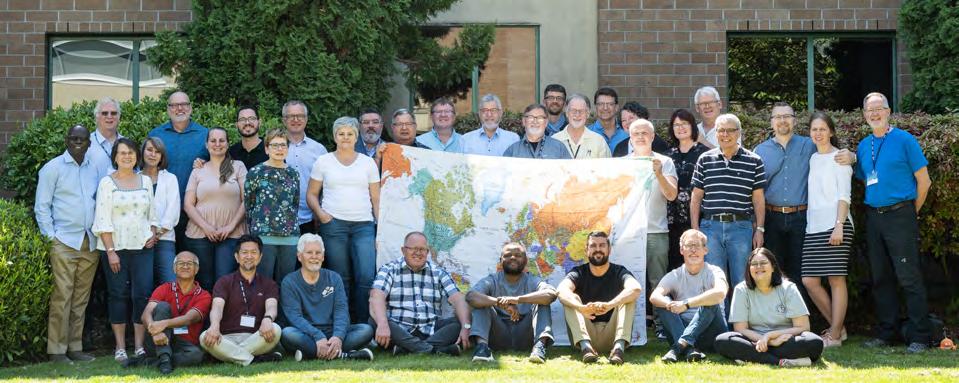
One thing I do: forgetting what is behind and straining toward what is ahead, I press on toward the goal to win the prize for which God has called me heavenward in Christ Jesus. ~ Philippians 3: 13b, 14

MISSION 13 MENNONITE BRETHREN HERALD JUNE 2023
Join MCC’s School Kit Challenge! Help 10,000 kids attend school around the world by donating 10,000 school kits during the month of August. How many can you do?
NIKKI WHITE is a writer and prayer mobilizer with Multiply
For more information,
Moses, a student in South Sudan, proudly displays his MCC school kit supplies. (Loreto Schools Rumbek photo/Herbert Orwa)
scan this QR code or visit mcccanada.ca/schoolkits

ORG U P HEAL THBEN E STIF MORT GAGES SNEP I O NADMINISTR A NOIT P A YROLL SERVI C E S CCA O UNTIN G SER V I SEC INVEST MENTS CES U RITIES DONA T I SNO $ (Cash, TFSA and RRSP accounts) CCMBC Legacy Fund serves pastors and churches by helping with administration and finances to free you for ministry in your local community. You weren’t called to do paperwork. We were! Are you juggling responsibilities? We exist to provide ministry-focused financial services to facilitate Kingdom Growth. Visit ccmbclegacyfund.com to learn more. Phone 1-888-669-6575 Email legacy@mbchurches.ca Investing in Kingdom Growth Together.
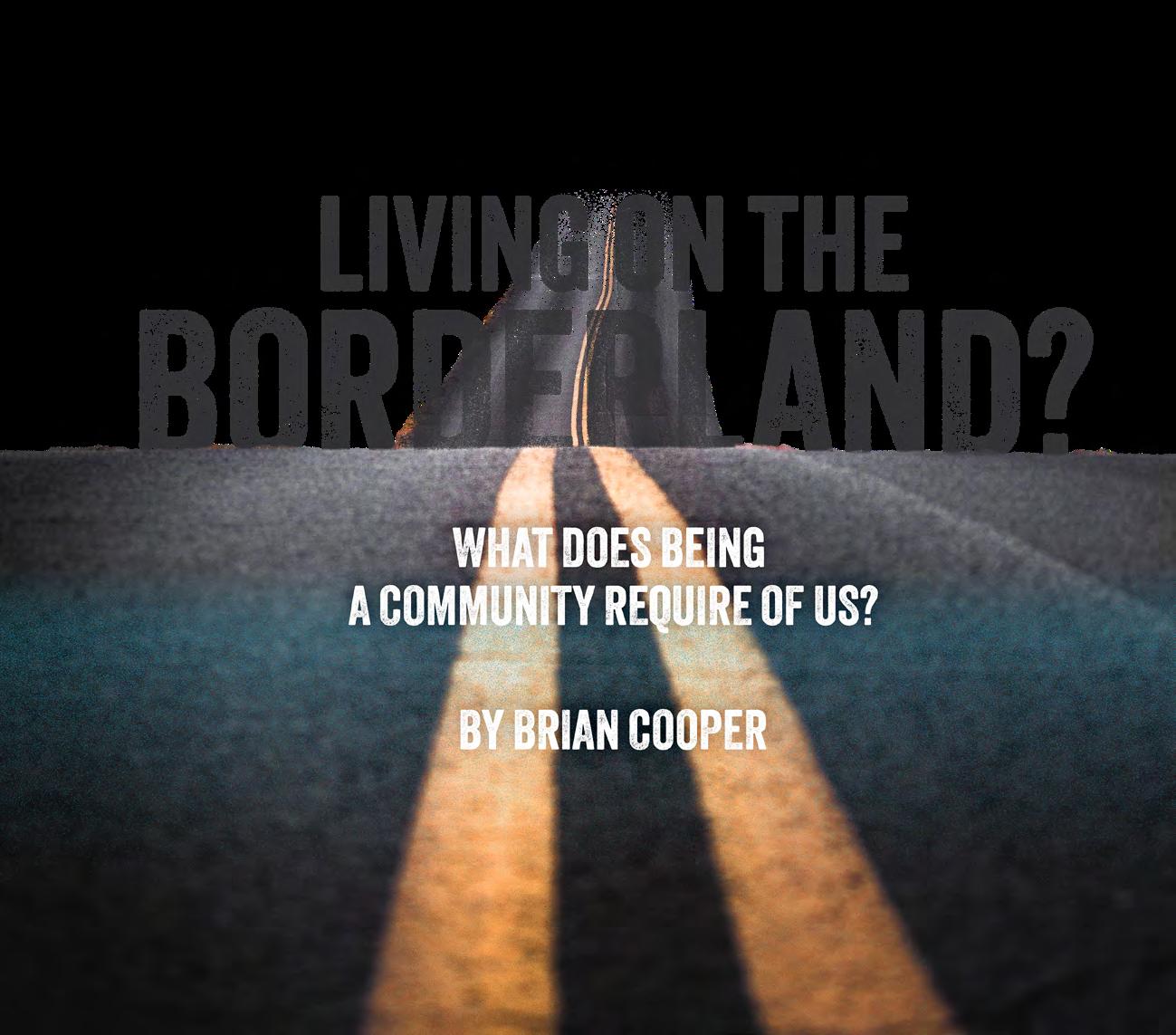
15 MENNONITE BRETHREN HERALD JUNE 2023
How did we get here?
Mennonite Brethren are Jesus-followers. We have always been. Over the years, we have acquired the habit of making our commitment to Jesus our fallback position when theological disagreements emerged. Sometimes, closer examination of the implications of this commitment helped overcome the disagreements. At other times, however, we took shelter in our common commitment to be Jesus-followers even while we allowed ourselves the privilege of agreeing to disagree. After all, isn’t a common commitment to Jesus enough? Well, in a word, not always.
The inclination to avoid controversy by attempting to frame unity simply on the basis of belief in Jesus rather than on a common substantive understanding of what that entails will not resolve our problems. Here’s a metaphor that I think is à propos.
We recognize and celebrate diversity in our denomination, aware that we are different and bring different gifts. It is like a choir. Some sing high, some low, and some in the middle. Choir members have differing abilities that affect the parts they sing. The harmonies that result are wonderful. But there is one non-negotiable. All the members of the choir need to be singing the same song, following the conductor. If they don’t the outcome is chaos, not harmony.
MBs have allowed unhealthy theological diversity to persist in a variety of areas for too long. It is becoming clear that less and less unites us. We need to be singing the same theological song.
What is a borderland church?
The theological conversations about LGBTQ+ inclusion are difficult. They reveal that there is hurt beneath the surface in our community, and there are different ideas about how to address it. I fully acknowledge that there are people on both sides of the issue that are motivated by a genuine desire to do good, as well as preserve a semblance of unity in our denomination.
While many leaders are calling for theological unity, I noted with interest a proposal that some churches might serve as what have been termed Borderland churches – congregational communities that have a different understanding on theological issues addressed in the Confession of Faith. Why? The goal is to find a comparative reference so that after a specified period of time (the proposal suggests 5-7 years), “there would be a complete evaluation of how the inclusion process is working in both Borderland and non-Borderland congregations as both seek to live out
our mission for the world.”1
It seems that the proposal is suggesting not only that MBs accept disagreement on what constitutes faithful human sexual expression, but also that Borderland churches be allowed to persist to see if they can embody a form of Christlikeness that is at odds with Christ’s teachings. Moreover, it is supposed that their example might prove the basis for rethinking what faithful sexuality looks like for the entire denomination. In the end, changes to the Confession of Faith could be suggested – or the Borderland churches could be asked to leave.
On the surface, this may sound like a plausible approach to take. A direct comparison between two different approaches will yield good comparative data, will it not? It’s actually not that simple, for a number of reasons. Data is useful only in reference to what is reliable, what is true. Let me tell why I don’t think the idea of a borderland church is compatible with faithfulness.
As described in the documents I have read, the idea of a borderland is adapted from the work of a Latina author who used the term in a cultural sense to describe an area – in her case, a region surrounding the US-Mexico border – where two cultures blur and influences merge.
In the MB church document I read, a borderland is a metaphorical place where theological influences come together to create an environment that is a mix of religious cultures. It is intended to create a space for disagreement. This disagreement might, in turn, lead to changes in what is seen as a dominant religious culture that people seeking a borderland perspective want to change.
Borderland – cultural and theological
The main shortcoming with this metaphor is that a theological confession does not invite influence from outside sources in the way that human cultures do.
Having grown up eating relatively bland food, I found trying Mexican, Indian, or Thai foods, with their enticing arrays of spices, an exciting experience.
But theological convictions don’t work the same way. I have been exposed to a number of denominations. I attended an Anglican college for my graduate studies in theology. I came to appreciate the history
1 Longhurst, John. “River East Church Proposes New Process for Mennonite Brethren Churches in Manitoba Living on the ‘Borderland’ of the Confession of Faith.” River East Church proposes new process for Mennonite Brethren churches in Manitoba living on the “borderland” of the Confession of Faith, February 28, 2023.
http://timetotellcanada.blogspot.com/2023/02/river-east-churchproposes-new-process.html
16 MBHERALD.COM JUNE 2023
and richness of the Anglican tradition, but I also was reminded of the reasons I am not Anglican. I have theological convictions that would prevent my joining an Anglican church, and I know that there are theological convictions that an Anglican would need to revisit before considering joining a Mennonite Brethren church. This is not a bad thing; we are different for good reasons.
Some influences go well beyond the limits of Christian theological commitments, however. In my graduate studies, one of my professors advocated reading the Psalms in a way influenced by Buddhist meditative practices. I quickly discerned that while it was helpful for me to know that others might read Scripture this way, faithfulness dictated that I read it differently, informed by historic Christian interpretive practices.
Theological priorities and directions
There are a multitude of external influences and pressures on Christian theology that believers need to pay heed – not as influences to embrace, but as dangers to avoid, both in terms of position and direction. Faithful Christian theology arises first from surrender to the lordship of Jesus Christ. This speaks to position. But it also calls believers to follow after Christ, to pursue intimacy with Jesus in teaching and example – direction -- and to encourage one another to do the same. The idea that there is a borderland – a call to move from the theological centre to a “wilderness road” – is foreign to Scripture.
When I read the Bible, I see repeated admonitions to press on toward Christ, to draw near to God, to follow closely. The overarching idea is that closeness rather than distance is theologically preferable. The very idea that a person, church, or group could participate in a denomination in theory but not in practice does not, in my estimation, ring true.
This does not mean that I avoid people in my life who are theologically far from God, in doctrine or attitude. But it does imply that setting aside my confessional commitments for the sake of other’s interests does not embody faithfulness in my life. Put simply, I do not see a valid call to move to the borderland for missional or other reasons. Culturally, willingness to embrace difference is a sign of openness, which is good. Theologically, it is a sign of syncretism, which is not. The question we need to ask is this: On what does this proposal ultimately rely?
Do we need a borderland?
It is also important to consider the implications of a borderland itself. The document I read seems to imply that the borderland is on the outer edge of the
Theologically, there is no such place as a borderland. As distasteful as this may be to some, it is impossible to occupy a Borderland place in relation to the Confession of Faith.
theological landscape embodied by our Confession of Faith. But in light of the acknowledgment that this document is motivated by a difference of theological opinion, I think the metaphor falls short of reality.
Theological diversity is fine in areas where the Confession of Faith is silent. MBs do not make an issue of whether or not we should own smartphones, or whether we should buy Apple or Android. But where we have spoken through the Confession, the call is to unity, not diversity.
Theologically, there is no such place as a borderland. As distasteful as this may be to some, it is impossible to occupy a Borderland place in relation to the Confession of Faith. The Confession (it is so named because it is intended to embody the faith that we confess, together) makes it clear that Mennonite Brethren have agreed together about the implications of discipleship in eighteen areas of life. Some of these eighteen articles are things we confess in common with other Christ-followers. Some are unique to Mennonite Brethren because of our context.
Theological discernment, permissiveness, and change
That we hold to these articles is not an act of judgment against others who name the name of Christ. It is differentiation. Believers who insist that they cannot affirm all the confessional articles with integrity need to follow in the strength of their convictions to a theological place where they can engage fully, and gladly. Proposing to inhabit a theological borderland lacks integrity,
17 MENNONITE BRETHREN HERALD JUNE 2023
“ ”
as does attempting to instigate change based on one’s own preferences, wisdom, or sense of identity.
I am very sympathetic to arguments that point to the fact that that for some time, some provincial MB leaders have been willing to grant latitude in certain areas of the Confession of Faith. Pastors entering the MB Conference with slightly different convictions regarding baptism and membership, atonement theology, or love and nonresistance (among other things) have been allowed to enter and participate fully, the only requirement often being that they not publically oppose confessional teaching. This latitude appears to set a precedent for how some might expect conference leaders would respond to borderland positions on human sexuality.
Moreover, Mennonite Brethren have shown willingness to change in a number of areas. Conference resolutions on women in ministry leadership, divorce and remarriage, and even television ownership have changed significantly. Is it possible that our theology of human sexuality is another area that needs review and revision?
Theology – moving closer together instead of apart
In a nutshell, I am convinced that the answer to this question is no, and that attempting to move toward a theological borderland is the way that leads to disaster. The impulse to adapt or change our theological convictions for our context may be common, but it is not the way of faithfulness. Theological review is not a bad thing, if it is motivated by a desire to read Scripture more attentively, faithfully and missionally. The result is affirmation of theological convictions that address the breadth of Scripture well, not only certain carefully chosen texts.
For example, many years of conversation about women in ministry showed that traditional views of male-only church leadership overlook clear evidence from Scripture that women served in leadership roles,
and were commended for their efforts. In the case of biblical teaching on human sexuality, there is not a single text that makes allowance for any sexual relations other than that between a man and a woman in the context of their marriage relationship. I am not convinced that Scripture contains a call from God to a borderland on this point.
Rhetoric that speaks of the inevitability of change effectively makes change itself the god we must serve rather than the God of Scripture. Change is not automatic; God’s change happens as God’s truth impacts our lives. It is true that change— enabled by the Spirit, revealed via Scripture, and embodied in the Confession of Faith — is often mediated through relationships that are often informal and organic. These need to continue.
The road ahead
It has become clear to me in recent years that Mennonite Brethren have done a poor job of clarifying how we ought to do theological reflection and discernment together. We have assumed that if we gather and read Scripture together, we will somehow reach agreement. The evidence before us is that this expectation is unfounded. We have people reading Scripture in different ways with different motives, and a common theological method escapes us even now.
The truth is that by allowing the unhealthy diversity that now exists, we are already living on the borderland. Our call is to return home – to Jesus, the centre—and to what we have understood as faithful discipleship as defined in Scripture and articulated in our MB Confession of Faith. The journey will not be easy, and some may choose not to come, not because they have been excluded, but because they are pursuing other priorities. That will be painful, but it will still be preferable to remaining where we find ourselves at present.
BRIAN COOPER
has passion is to help believers do theology well and to understand how to engage cultural issues, theological and historical texts, and Scripture deeply in order to meaningfully bring Kingdom values to bear on their context and impact their world for Jesus Christ. Brian serves as Associate Professor of Theology at MB Seminary and is a member of South Abbotsford Church.

18 MBHERALD.COM JUNE 2023
A meaningful contribution
Women in ministry
SHARON SIMPSON
Sharon Simpson was born in India to mission ary parents. Growing up, Sharon felt a connection to both India and Canada, even though her time in India was very short as an infant before moving back to Chilliwack, British Columbia

All four of Sharon’s grandparents from both her maternal and paternal side were refugees from Russia, but Sharon’s family of origin forged a new path for the upcoming generations in Canada.
“We called our Grandparents by their English names and we ate curry. I thought it was Mennonite food,” she recalls.
In Sharon’s world, mission work was standard practice; all of her relatives served in the mission field at some point in their lives.
At four years old Sharon’s mother led her in prayer and she became a Christian.
“My parents are amazing. My father became a surgeon and he and my uncle were two of the three surgeons in Chilliwack. They addressed many social issues that bring people into a place of needing surgery,” she says. “My parents were generous, faithful, thoughtful, and loved people.”
Beyond This Life
Being faithful and generous people didn’t spare Sharon’s family from heartache. Her brother Brian was very ill through their growing up and eventually passed away at age 20 from lung cancer.
“There was a lot of hope but a lot of trauma. We were normal! But my parents really lived faithful lives and trusted in God,” she remembers.
Sharon and her now husband Garry had just got engaged right before the news of Brian’s lung cancer. In the three months between her brother’s diagnosis and her wedding, Sharon felt a special call from God.
“During that time I felt like God wanted me to do something I had never done before with my brother, which was to have meaningful spiritual conversation.”
The siblings did devotionals together every day, and he was even baptized two weeks before he died. As painful as Brian’s death was for the family, they maintained their hope and faith in Jesus. In fact, when a nurse at the Cancer Care clinic raised concerns about their hope, Sharon’s dad replied, “We’re just going to be okay. He has a hope and a future beyond this life.”
Sharon and Garry were married a week after Brian’s passing.
19 MENNONITE BRETHREN HERALD JUNE 2023
A new start
In their first year of marriage Sharon and Gary moved to Winnipeg, Man. Sharon was working as the Associate Campus Director with Campus Crusade for Christ at University of Winnipeg and met two other women who were experiencing deep loss of loved ones. They started a group together and called it The Death Group.
“We used 'The Holy Spirit' booklet about allowing the Holy Spirit to have complete control and complete trust, speak to you, comfort you. It’s the only material we used for a year and it’s only 10 pages long. The Holy Spirit became very real to me. He’s a comforter, he’s a constant presence.”
After living in Winnipeg, Sharon and Garry moved to Calgary and began to have their children.
“We lived by faith, we had people who sponsored us financially. It was a really interesting time to lean on God for everything we needed all the time. We did that for 12 years and we had four kids in five years over that time.”
They lived close by to the University of Calgary and invited hundreds of students into their home over the ten years they lived there. Those students were greatly impacted in their faith because of Sharon and Gary.
Transitions
In 2000 things began to get very challenging for Sharon and her family. Starting with a move back to Chilliwack to be near her father as he became more and more ill due to Multiple Sclerosis. Sharon and Gary’s son became very ill with rheumatic fever, Sydenham’s chorea, tourettes, and other mental illnesses.
“We had a psychiatrist, neurologist, cardiologist, and nephrologist in our house. It’s funny how fast you can go from everything normal to everything gone,” she says, “When our son was sick I became really angry with God. A big part of my life has been coming to terms with the sovereignty of God.
During this time with stressors adding up, Sharon went back to work.
“I didn’t do it voluntarily, I wanted to be home with my kids. In the late nineties I began to learn graphic design. I had bought graphic design books from Costco and worked on a laptop that one of our supporters had given us.”
About a year into her son’s illness, Sharon went to a conference in California called Ultimate Leadership.
“It was life changing for me” she says, “My group became quite bonded, the yellow group. After we finished that group, myself and six men met every single month for support and care for six years. I felt like they were like brothers to me. They helped me understand how much money it takes to actually live. It was very healing for me.”
Between 2003 and 2013 Sharon wore multiple hats in the workforce. She worked as a graphic designer, ran her own marketing strategies business, and in May 2013, she became the Director of Stakeholder Engagement at Menno Place, a home for seniors.
“It was rich and meaningful to me and really hopeful to meet people in their 80s and 90s, some of the first people to arrive in Canada as Mennonites after the Russian revolution. Those people told stories to me that were deep stories of faith. They had the long view. That’s what seniors give us, especially seniors of faith,” she says.
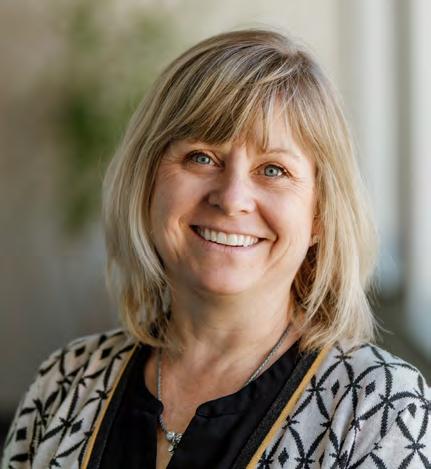
20 MBHERALD.COM JUNE 2023
“We lived by faith, we had people who sponsored us financially. It was a really interesting time to lean on God for everything we needed all the time. We did that for 12 years and we had four kids in five years over that time.”
Sharon’s boss at the time thought it would be a good idea for her to be part of a board. She joined both MCCBC and BCMB (secretary) boards in 2015. In 2018 Sharon was asked to be the moderator of the BCMB board.

“It was a situation that had elements of it that were clearly from the Lord and everybody involved would say so. I am always grateful that that’s how the beginning of my service started. I can look back, and when it got hard I knew that God had placed me there in that position of leadership,” she says. “The finest people I’ve met in my whole life are people I’ve served with at the Canadian Conference and the BCMB board.”
The gift of leadership
Being the first female moderator on the BCMB board brought its own share of trials.
“I don’t know if I ever called myself a leader, I was just frustrated if I wasn’t a leader.
Being the BCMB moderator I had never gone to a conference before, never participated in pastor’s work. I was completely unknown, I could see how people would have had trepidations about me,” Sharon says. “I do want to inspire young women, the women who have a gift of leadership. My deepest desire is that they would have the opportunity to give a contribution the way that I have had the opportunity to give a contribution.
Wholeheartedly, sincerely, with skill that God has given me, humbly and without being demeaned.”
Sharon says she worked hard to be a good leader and never took it upon herself to change anyone’s mind about the role of women in ministry.
“I’ve just asked God that I could be faithful with what he’s given me and that I would be faithful to him and let it land where it lands,” she says.
Sharon would like to thank all the people on the BCMB board who mean so much to her.
“Never in my life have I felt that I had the opportunity to make a more meaningful contribution than when I was on the board of BCMB.”
As Sharon looks back at her lifetime of faith, a verse that stood out to her in Grade 11 still rings true for her today.
Luke 12:48, “To whom much is given, much will be required.”
"I never felt like God was saying, 'So you better do something' but it felt like, 'acknowledge what you have and follow me' so you do your best with that. That has become stronger and stronger for me," she says. "It's spiritual work we've done, and it's been hard but so meaningful to me."
21 MENNONITE BRETHREN HERALD JUNE 2023
“I do want to inspire young women, the women who have a gift of leadership. My deepest desire is that they would have the opportunity to give a contribution the way that I have had the opportunity to give a contribution. Wholeheartedly, sincerely, with skill that God has given me, humbly and without being demeaned.”
KIMBERLY MCINTYRE enjoys writing stories of transformation, faith, and the human experience. She has a Communications and Media degree from Canadian Mennonite University.
More than a scholarship*
*technically it’s a grant!
Applying for scholarships and bursaries is a process that savvy students embrace as an annual ritual. Even though completing these applications is not usually described as an exhilarating experience, receiving a financial award can sometimes be the determining factor that enables a student to continue their education.

Financial incentives are important, but there are other parts of the equation that are critical for students to balance, such as work responsibilities, family priorities, and energy restraints. If students wish to succeed, they need much more than personal ambition and sufficient finances. They need a community that supports them with affirmation, discernment, and enriching opportunities. This is a scenario that Jesse Wilson, Pastor of Community Groups at Northview Church in Abbotsford, B.C., has experienced while working toward his Master of Theological Studies at MB Seminary. “It was helpful to receive financial support and to know that my church leadership (which at that time was at Central Heights) was behind me in my studies. Continuing education for increased ministry effectiveness was a value for both me and our church.”
Supporting a student through graduate studies is a community
effort. The newly approved Leadership Development Partnership Grant (LDPG) is designed to provide value that goes far beyond tuition dollars. The program is a part of a national strategy to strengthen the development of leaders who are called into ministry-related work. It combines local church discernment with a pathway of equipping and supporting leaders within the MB denomination.
Discernment
The LDPG is initiated by local churches who identify suitable candidates and make a commitment toward their ongoing development. The church agrees to fund 25% of the candidate’s tuition costs and provides opportunities for ministry service while benefiting from the LDPG. But it’s more than discernment…
Partnership
Candidates who have been affirmed by their local church will be eligible to enrol in courses at a participating LDPG graduate school (MB Seminary, MB GTE Track at CMU, or ETEQ), provided they meet the institution’s requirements and are accepted into a graduate program. These courses will equip students with biblical and theological training and strengthen their ministry skills, enabling them to increase their effectiveness at their local church. The student will also
benefit from regular interactions with faculty, staff, and denominational leaders. But it’s more than partnership…
Funding
Once a candidate is admitted into a graduate program at a participating school, the student will receive an additional 50% toward their tuition costs (25% from CCMBC and 25% from the school), providing them with a total of 75% of their tuition funding. But it’s more than funding…
Health
The LDPG marks a turning point in the life of our national conference. Leadership development is regularly cited as an essential component of a healthy denominational foundation, but an investment in this value has been delayed by financial limitations. The launch of the LDPG is a cause for celebration—it sets a directional course for equipping leaders across the country, and it also highlights the financial stability of our national conference.
>> You can learn more about the Leadership Development Partnership Grant by visiting mennonitebrethren.ca/ldpg.
22 MBHERALD.COM JUNE 2023
JUNE, 2023
Moments in prayer
HOLY SPIRIT—FILL US WITH YOUR KINDNESS
THE LORD APPEARED TO US IN THE PAST, SAYING: “I HAVE LOVED YOU WITH AN EVERLASTING LOVE; I HAVE DRAWN YOU WITH UNFAILING KINDNESS .” (JEREMIAH 31:3)
AND GOD RAISED US UP WITH CHRIST AND SEATED US WITH HIM IN THE HEAVENLY REALMS IN CHRIST JESUS, IN ORDER THAT IN THE COMING AGES HE MIGHT SHOW THE INCOMPARABLE RICHES OF HIS GRACE, EXPRESSED IN HIS KINDNESS TO US IN CHRIST JESUS (EPHESIANS 2:6-7)
BUT WHEN THE KINDNESS AND LOVE OF GOD OUR SAVIOUR APPEARED, HE SAVED US… (TITUS 3:4-5)
BUT THE FRUIT OF THE SPIRIT IS LOVE, JOY, PEACE, FORBEARANCE, KINDNESS , GOODNESS, FAITHFULNESS, GENTLENESS AND SELF-CONTROL. AGAINST SUCH THINGS THERE IS NO LAW. ” (GALATIANS 5:22-23)
THEREFORE, AS GOD’S CHOSEN PEOPLE, HOLY AND DEARLY LOVED, CLOTHE YOURSELVES WITH COMPASSION, KINDNESS , HUMILITY, GENTLENESS AND PATIENCE. (COLOSSIANS 3:12)
DO YOU SHOW CONTEMPT FOR THE RICHES OF HIS KINDNESS , FORBEARANCE AND PATIENCE, NOT REALIZING THAT GOD’S KINDNESS IS INTENDED TO LEAD YOU TO REPENTANCE? (ROMANS 2:4)
Iwas at the hospital recently and a woman walked past wearing a t-shirt with the words “Kindness is not in quarantine” blazoned across the front. I smiled at first and then was sobered to think of how, in these past few years, there have been many places and ways people have needed reminders to be kind to each other. We can all recall the slogan that gained notoriety during the pandemic: “Be safe. Be calm. Be kind.” Be kind. The fact that these reminders have been needed demonstrates that kindness has not been the norm of late in our culture.
In a staff meeting not long ago, we were talking about a particular young man I did not know well. My colleague was trying to describe this individual to me, and spoke of his
SPIRITUAL HEALTH AND THEOLOGY
23 MENNONITE BRETHREN HERALD JUNE 2023
good qualities, like how friendly he is, his soft heart and other good characteristics he exhibits. After some more descriptors, I realized which young man he was referring to and instantly felt convicted. Why? My first thoughts of this young man were unkind. I only thought of his deficits. My colleague thought of his good qualities. The conviction that came to me, was initiated by the incredible kindness my colleague showed in the way he chose to describe this person. The kindness my colleague displayed made me repent in that moment for my unkind attitudes toward that young man.
Kindness leads to repentance. That moment with my colleague made me think of that Scripture above from Romans 2, how it is God’s kindness that leads us to repentance.
God first loved us and revealed that love through the person of Jesus. God pursues us through the person of Jesus and the Spirit of God draws attention to our Lord’s kindness. When we become fully aware and alive to the depth of God’s kindness extended to us in love, how can we not turn from our own sin and respond with repentance, deep gratitude and joy? Our God is so very kind to us.
Where do we first need to receive God’s kindness for ourselves? Maybe we have hardened our hearts, so that we don’t notice his kind nudges that can lead us to an awareness of our own need for repentance.
Where do we need to extend kindness to others? How do our words, attitudes and actions reveal a lack of kindness? Kindness is both a fruit that grows in us by the Spirit of God (Gal 5:22) and also something that we can clothe ourselves with (Col 3:12). It is both a gift of God and a choice we make in how we relate to others. If we have not first experienced the kindness of God for ourselves, it will be difficult to extend it to others.
CONSIDER:
Where does your heart need to soften to the kindness of God that leads you to repentance? How can you clothe yourself in kindness today, even as you swim against the stream of your own thoughts and attitudes and the unkind actions and words that swirl all around you?
PRAY WORDS OF INVITATION AND WELCOME TO THE HOLY SPIRIT FOR YOUR OWN HEART:
˚ Welcome Holy Spirit! Come and fill me today!
˚ Welcome Holy Spirit! Overwhelm me with a new realization of the kindness of the Father extended to me in Jesus.
˚ Welcome Holy Spirit! Soften my heart to notice nudges of kindness that lead me to repentance.
˚ Welcome Holy Spirit! Help me to clothe myself in kindness when it is easier to say, think or do unkind things.
PRAY WORDS OF INVITATION AND WELCOME FOR THE CHURCH:
˚ Welcome Holy Spirit! Come and fill us today!
˚ Welcome Holy Spirit! Overwhelm us with your kindness expressed to us in the person of Jesus. May your kindness so fill us that we cannot help but repent.
˚ Welcome Holy Spirit! Grow the fruit of kindness in us - in our thoughts, in our words, in our attitudes towards others.
˚ Welcome Holy Spirit! May we clothe ourselves in kindness in a way that invites others to experience our great Saviour.
˚ Welcome Holy Spirit! Help us to be kind to those with different personalities, temperaments, ideas and worldviews than ours.
CONNIE MAIER is Pastor of Outreach & Implementation at Glencairn MB Church in Kitchener, ON. She is a self-confessed book and coffee snob and a wannabe poet.

24 MBHERALD.COM JUNE 2023 SPIRITUAL HEALTH AND THEOLOGY
ARTICLE 1: GOD 1
NATIONAL FAITH AND LIFE TEAM
NEW TO THE MB CONFESSION OF FAITH: ARTICLE 1 EXPLANATORY NOTES
PREAMBLE:
The National Faith & Life Team (NFLT) is tasked with the provision of resources related to the MB Confession of Faith. They have taken on the task of updating the existing resources (viz., Commentary, Pastoral Application) that have been in use for over twenty years. In 2020, the NFLT began the long-term project of rewriting and updating the resources for each of the 18 articles in the MB Confession of Faith. The new resources will include Explanatory Notes and FAQ responses for each article. The following is an excerpt of Article 1: Explanatory Notes. For the complete document see here.
If you have feedback and/or questions related to these Article 1: Explanatory Notes, please send them to listeningwell@ mbchurches.ca Thank you for your participation in this project.
Ken Esau CCMBC National Faith & Life Director
We believe in the one, true, living God, Creator of heaven and earth. 2 God is almighty in power, perfect in wisdom, righteous in judgment, overflowing in steadfast love. 3 God is the Sovereign who rules over all things visible and invisible, the Shepherd who rescues the lost and helpless.4 God is a refuge and fortress for those in need.5 God is a consuming fire, perfect in holiness, yet slow to anger and abounding in tender mercy.6 God comforts like a loving mother, trains and disciplines like a caring father, and persists in covenant love like a faithful husband.7 We confess God as eternal Father, Son, and Holy Spirit.8
1 A.W. Tozer is well known for saying: “What comes into our minds when we think about God is the most important thing about us.” The MB Confession begins then with what is most important. It does not start with human beings, salvation, revelation, or the Second Coming of Jesus but simply with “God.” Article 1 presupposes that the God described in the Old and New Testaments is a true reflection of the actual God. Even with this large collection of material, we must admit that all of our human language and all of our human reason is inadequate to fully describe God. Theologians use the word “ineffable” to describe how God is beyond everything our human language is capable of describing. Article 1 uses limited human language to try to capture the magnitude of God’s beauty, majesty, character, goodness, and self-giving love that should lead every human being to bow down in joyful worship.
Article 1 does not use philosophical and extra-biblical words like omniscience, omnipresence, omnipotence, immutability, impeccability, infinity, providence, or even Trinity but rather uses the language, metaphors, and descriptions of divine actions that come directly from Scripture. While there are three main sub-headings (God the Father, God the Son, God the Holy Spirit), Article 1 stands as a kaleidoscope through which many rich and colourful biblical statements about God are placed side-by-side.
In Article 1, God (Father, Son, and Spirit) is described by what the Triune God is personally doing and has done. It is clear that there is really no solid way of knowing God’s character and being apart from telling God’s story from original creation to future re-creation, from the Garden to the New Jerusalem. God is healing the brokenness that continues to rage through
SPIRITUAL HEALTH AND THEOLOGY 25 MENNONITE BRETHREN HERALD JUNE 2023
the biblical story: brokenness between humans and God, humans and each other, humans and creation, and even humans and their own selves. The Old Testament uses the word “shalom” in reference to the state of these healed relationships while the New Testament uses the words “Kingdom of God” (or even “eternal life”). We learn the most about God’s character, purposes, and love when we study what we could call God’s shalom restoration story or God’s Kingdom story. This is the story that reveals the triune God most fully and is the invitation to salvation and become part of his story.
2 It is appropriate to begin with this four-part affirmation about God because everything comes from this.
a) God is One. This central Old Testament claim about God comes from Deuteronomy 6:4 (what Jewish folks refer to as the Shema): “Hear, O Israel: The LORD our God, the LORD is one” (or “The LORD is our God, the LORD alone”). This text fundamentally rules out the worship of anything (e.g., worthless idols) or anyone other than God (Exodus 20:2-6; 34:17; Leviticus 19:4; 26:1; 1 Samuel 12:21; 2 Kings 17:15; Psalms 78:58; 96:5; Isaiah 44:69; Jeremiah 10:8).
b) God is the one true God (2 Chronicles 15:3; Isaiah 65:16; Jeremiah 10:10; John 17:3; 1 Thessalonians 1:9; 1 John 5:20).
Article 1 affirms orthodox monotheism. Only the biblical God revealed as the LORD (Yahweh) is God. Yahweh is the personal name for the “one true God” (Exodus 3:13-15) and the only “living God” (Deuteronomy 5:26; Joshua 3:10; Psalm 42:2; Matthew 16:16; Acts 14:15). Scholars have a variety of meanings for the name Yahweh (or Jehovah in the KJV). It could be the third person singular form of “I AM WHO I AM,” or “I WILL BE WHAT I WILL BE,” or even “I CAUSE/CREATE TO BE WHAT I CAUSE/CREATE TO BE.”
In the ancient world, pagan gods were often considered to be in control of important areas of life like fertility, weather, or war, and these gods were given physical forms that fit that domain (e.g., bull, lion, human female, human male warrior, etc.). In addition, their names were used in incantations and rituals in order for humans to control the gods for personal benefit. Yahweh’s name in itself is saying: “I am not like these other gods.” Yahweh is not limited to any one area of the created order but his throne is “far above all rule and authority and power and dominion, and above every name that is named, not only in this age but also in the age to come” (Ephesians 1:21). No form or image is adequate to express Yahweh’s character and purposes (until
of course, God becomes incarnated in Jesus [Colossians 1:15]). Yahweh’s great name remains elusive and cannot be manipulated by humans for their benefit.
c) God is the living God (Jeremiah 10:10; Psalm 42:2; 84:2; Deuteronomy 5:26; Joshua 3:10; 1 Samuel 17:26; 2 Kings 19:4; Matthew 16:16; Romans 9:26). Yahweh is truly alive and active in the world. He is not asleep or absent. He is not an idol perched in a temple. Yahweh is able to live with and walk among his people who are called the “temple of the living God” (2 Corinthians 6:16).
d) God is the Creator of heaven and earth (Genesis 1-2; 14:19,22; Isaiah 40:28; 42:5; 45:18; Romans 1:25). All heaven and earth owe God worship and service because God is the Creator (Nehemiah 9:6; Psalm 148). But it is also clear that God did not create humanity “as if he needed anything” since “he himself gives everyone life and breath and everything else” (Acts 17:25).
3 While it is of great significance that the Triune God is the one, true, and living God who is Creator of all, this does not yet tell us much about the character of this God. Will this God be capricious and selfish, imposing slavery upon humanity for God’s own benefit? We are now told that God is almighty in power (Exodus 15:2-3; Isaiah 6:3-5; 37:16; 44:16; 47:4) which explains how God is the powerful Creator, Redeemer, and King. God is perfect in wisdom (Daniel 2:20; Job 12:13; Psalm 104:24; 139; Isaiah 28:29; 55:8-9; Jeremiah 10:12; Romans 11:33), righteous in judgment (Psalm 4:1; 7:11; Isaiah 5:16; Romans 2:5), and overflowing in steadfast (covenantal or hesed) love (Exodus 34:6-7; Psalms 136; Deuteronomy 7:9-12; 23:5; 2 Chronicles 6:14; Nehemiah 9:17). The New Testament word agape carries this meaning (John 3:16; Ephesians 2:4; 2 Timothy 2:11-13; 1 John 4:810). Covenantal love involves kindness, affection, forgiveness, sacrifice, self-giving, and faithfulness. In reference to God, his unconditional, sacrificial, and tenacious love overflows beyond the obligations of relationship. As 1 John 3:1 says:
“See what great love the Father has lavished on us, that we should be called children of God!”
The wonderful news is that God’s almighty power is displayed (past, present, and future) in a way consistent with perfect wisdom, righteous judgment, and steadfast love. Worship of this God is to be a response not simply from obligation but from joyful volition because of God’s beautiful character which will be actively lived out for the ultimate well-being of all creation. God’s character is part of the good news!
26 MBHERALD.COM JUNE 2023 SPIRITUAL HEALTH AND THEOLOGY
4 Article 1 is describing a key element in the nature of God. God is not only a transcendent (“way above us”) Sovereign/King ruling high above with power and authority (1 Samuel 12:12; Psalm 5:2; 44:4; 47:7; 57:5; 95:3; Isaiah 6:5; 37:16; 44:6; Jeremiah 10:10; 1 Timothy 6:15-16) but also is an immanent (“close by us”) Shepherd (Psalm 23; Isaiah 40:11; Ezekiel 34:11-16; Zechariah 9:16; John 10:11-14; Revelation 7:17).
The Old Testament combines the images of King and Shepherd first in reference to God (Genesis 49:2425; Psalm 23:1; 28:9; 80:1). To “shepherd” Israel is king or leader language (Numbers 27:17; 2 Samuel 5:2; 7:7; 1 Kings 22:17). In terms of an Old Testament king, this language is combined most clearly in King David whose occupation as a shepherd of sheep was perfect preparation for his role of being a shepherd/King of Israel (2 Samuel 24:17; Psalm 78:72). In the New Testament, Jesus is the “good shepherd” (John 10:10-18), the “king of the Jews” (Matthew 2:2; 27:11,37), and ultimately the “King of kings” (Revelation 19:16).
God is the almighty King who rules like a shepherd. God “will search for the lost and bring back the strays. [God] will bind up the injured and strengthen the weak…. [God] will shepherd the flock with justice” (Ezekiel 34:16). This is why words like love, affection, and deep loyalty are appropriate responses to this unusual sort of King.
5 God is our “refuge” (Deuteronomy 33:27; Psalm 9:9; 46:1), and “fortress” for those in need (Psalm 18:2; 144:2; Jeremiah 16:19). Refuge and fortress language speaks of safety and protection in the midst of danger, threat, and need.
6 All of these qualities of God are reflections and products of God’s “covenantal,” hesed, or agape love. We must resist any attempt to separate these qualities from our foundational understanding that God is abounding in covenantal love because “God is love” (1 John 4:8, 16).
God is a “consuming fire” (Deuteronomy 4:24; Hebrews 12:29). This kind of fire “eats,” “consumes,” or “devours” what is in its path. Because God cares deeply about his created world, he is a “consuming fire” opposing evil and burning up what is contrary to his Kingdom purposes (e.g., injustice, idolatry, unrighteousness). This metaphor should be heard as good news in a world where evil often seems to reign unchecked.
God is “perfect [or majestic] in holiness” (Exodus 15:11; 1 Chronicles 16:29: Psalm 29:2; Leviticus 11:44; Isaiah 6:3). Holiness can simply mean set apart or unique but when used in relation to God, the Almighty Creator and King, God’s holiness has an implication of incredible power that burns up (hence the “consuming fire”) every unholy (or “impure”) element
that gets close. Holiness is both an indication of this power and, in reference to Yahweh, a word that embodies God’s moral qualities of righteousness, perfect wisdom, and justice.
While God is a holy and consuming fire, we can be comforted that God is “slow to anger and abounding in tender mercy ” (Psalm 86:15; 145:8; Exodus 34:6; Numbers 14:18; Nehemiah 9:17: Joel 2:13; Jonah 4:2). The Bible does not pretend that God never gets angry about all that “steals, kills, and destroys” (John 10:10; Nahum 1:3). A Shepherd King who is “abounding in tender mercy [hesed or agape love]” would not be truly loving without acting in the face of evil, injustice, and unrighteousness. God’s anger is not a denial of his boundless love but a demonstration of it (see Isaiah 57:15-19).
7 The primary relationship metaphor in the Bible is God’s loving covenant with his people (Genesis 12,15; Exodus 20; 1 Samuel 7; Jeremiah 31; Luke 22:20). Covenant relationships are based on mutual self-giving love, kindness, affection, loyalty and commitment. The analogies of King/people, parent/child, and husband/wife are all found in the Bible to help us understand God’s hesed love to his people. God’s love “endures forever” (Psalm 136; Lamentations 3:22). Since King/people is a metaphor that for most of us today does not carry a clear understanding of deep mutual affection displayed through self-giving actions, our closest understanding of the sacrificial and unconditional nature of covenant love is that displayed in families. The Bible draws on these comparisons in order to help us understand something of God’s immense and abounding covenant love towards us.
God’s actions are like those of a “loving mother” (Isaiah 66:12-13; Hosea 11:3-4), a “caring father” (Psalm 103:13; 68:5; Isaiah 63:16; Hosea 11:1-4; Luke 11:2-4, 13; Romans 8:15; Hebrews 12:7-11), and a “faithful husband” (Jeremiah 31:31-34; Deuteronomy 7:6-9).
8 Article 1 follows the New Testament witness of being both monotheistic and trinitarian without any attempt to explain or resolve this tension. This short statement that God is “eternal Father, Son, and Holy Spirit” has profound implications for all 17 confessional articles that are to follow.
The New Testament provides clarity that this one, true, living God eternally exists as three persons (Father, Son, Holy Spirit). Paul affirms the Shema (God is One) but remarkably includes Jesus within this affirmation of oneness when he says: “yet for us there is but one God, the Father, from whom all things came and for whom we live; and there is but one Lord, Jesus Christ, through whom all things came and through
SPIRITUAL HEALTH AND THEOLOGY 27 MENNONITE BRETHREN HERALD JUNE 2023
whom we live” (1 Corinthians 8:6). Paul then affirms how the Holy Spirit cannot be separated from the Father and from Jesus: “no one can say ‘Jesus is Lord’ except by the Holy Spirit” (1 Corinthians 12:3). Peter in his confrontation of Ananias, uses the Holy Spirit interchangeably with the word God (Acts 5:3-4). Although the word “Trinity” is not used in the New Testament, its fundamental reality is undeniable (cf. Matthew 28:19; 2 Corinthians 13:13; 1 Peter 1:2).
The New Testament takes the earlier affirmations about the character and actions of God and connects them with Jesus. For example, while God created the heavens and the earth (Genesis 1:1-2:3; Psalm 33:6; Isaiah 40:28; 42:5), the New Testament declares that Jesus was there, actively involved as God’s agent of creation (Romans 1:25; Colossians 1:15-16).


There are significant and very practical theological and ethical implications concerning our conviction that God is eternal Father, Son, and Holy Spirit:
a) God is “eternal” and for all eternity has existed and continues to exist as Father, Son, and Holy Spirit. Even though this truth was not revealed to the Old Testament people of God, it is an eternal truth.
b) God as Father, Son, and Holy Spirit means that in a way beyond our understanding, these three have been in “relationship” eternally. God did not suddenly become relational after the creation of humanity, but God has always been in relationship within the Father, Son, and Holy Spirit. Relationship is fundamental to God.
c) Human beings are created in God’s image (commonly referred to with the Latin expression imago dei) which means humans are also fundamentally relational beings. To be human is to be relational: “It is not good for the man to be alone” (Genesis 2:18).
d) God is one in purpose, character, authority, and mission. The Father, Son, and Holy Spirit all share the same love, holiness, justice, authority, and mission. The Father, Son, and Holy Spirit all share in the creation, redemption, and final new creation. They are not in conflict with each other at any point.
e) God is one in discipleship expectations for the people of God. Thus, obedience to the Son, for example, cannot be in conflict with obedience to the Father and/or the Holy Spirit. Discipleship language of “imitating God” (Ephesians 5:1), being “transformed into [Christ’s] image” (2 Corinthians 3:18), and reflecting the “fruit of the Spirit” are all ways of describing the same goal.
by Philli P A. Gunther
28 MBHERALD.COM JUNE 2023
Letters to my Friends Words of Faith, Hope and Encourgement
Available now at KindredProductions.com Kindred Productions
Finish lines
RENATE CLARA RUPPERT
Renate Clara Ruppert was born on August 20, 1923, in Slawgorod, Siberia, to David and Sarah Penner. In 1929 the family traveled to Moscow in an effort to leave Russia. Instead of being able to emigrate, her father was detained and sent back to a concentration camp in Siberia where he died after ten years of imprisonment. Later her mother, two brothers, and three sisters were also incarcerated; only her sisters survived. Helen was released after six months, and the other two sisters were able to gain their freedom eight years later, at the end of World War II. Left alone with only one sister, Helen, they became refugees in Germany and were finally able to emigrate to Canada in 1948. They settled in Vancouver, BC where Renate held various jobs in a hospital, a factory, and the Jericho Hill School for deaf and blind children. In 1963 she moved to Clearbrook, BC where for seven years she worked at the Tabor Home. While living in Clearbrook she met George Christian Ruppert who became very interested in getting to know her better. At first, she did not accept his courtship because he was not a Christian. He was persistent, however, and asked for time so that he could get to know her and understand her beliefs. She gave him all the time in the world, but refused to marry him until she was sure that he had become a committed Christian. After George was baptized they had a short courtship and then got married on May 23, 1970. They had a very good relationship that lasted 28 years. On May 16, 1998, George went to his heavenly home. Renate had many friends due in part to her sunny personality – but the friend she felt closest to was the Lord Jesus. Early on in her relationship with Him she often struggled with doubts. But then one day, when she was attending an evangelistic rally with the Janz Team, she had a vision where everything around her suddenly went dark, and the only thing she saw was the figure of Jesus who asked her: “Du willst nicht?” (Do you not also want to come?”) At once she answered joyfully: “Ja, Herr ich will.” (“Yes, Lord, I want to.) At that moment she felt as if everything about her was stripped away and she was clothed anew. A great joy filled her heart which never left her, and she never doubted again. This joy radiated from her face and spread to all who met her. Renate loved to be involved in her church. She taught Sunday school, sang in the choir, made floral arrangements, and generally helped out where she could. She never missed a meeting while her health permitted it. Renate is predeceased by her husband George and all her siblings. She leaves to mourn many friends who will sorely miss her loving support, her listening ear, her friendly smile, and her contagious laughter.
Birth: August 20, 1923
Death: August 7, 2022
Birthplace: Slavgorod, Russia
Parents: David & Sara (Kroeker) Penner
Married: George Ruppert [d. 1998]
Church: Clearbrook, Abbotsford, B.C.
ERNST REDEKOPP
Ernst’s family lived under the Soviet regime until 1941, often going cold and hungry. His father assisted the German Army as translator; they moved often. Ernst was known for getting into trouble, or as he put it: helping. When a German plane landed in a nearby field, curious Ernst was first on the scene; he offered the pilots directions to the town they were looking for, and unbeknownst to his parents, scored his first plane ride. In 1943 when the German army retreated, the Redekopps left for Poland. As they fled the Russians toward Germany, the children were separated from their mother, so Ernst took charge until they reunited. His father, who was still serving in the German Army, met them in Germany. The Ukrainian refugees of German descent feared being returned to Russia, so through Mennonite Central Committee, the Redekopps sailed to South America in 1947 on the Volendam. After a 6-month journey full of challenges and delays, first in Argentina and then in Paraguay, they arrived in Chaco, Paraguay. Ernst left for Brazil in 1952 to complete his apprenticeship as a lathe operator, where he stayed with his Enns relatives who accepted him as their own. Ernst made people laugh and feel comfortable. He worked more than 16 years repairing cars, even making parts that were no longer available. After Ernst and Luisa married, they lived first in Curitiba and then raised their family in Boqueirao. In 1973 they immigrated to Canada, settling in Vancouver. Ernst liked to travel: taking 47 annual trips to Osoyoos. Ernst and Luisa retired to Abbotsford in 1997. Ernst enjoyed watching cars go by and watching Bonanza and Wheel of Fortune. His commitment to church deepened over the years. Not one to wear his beliefs on his sleeve, only in his later years did Ernst share about his early spiritual experience: how at 20, he accepted Isaiah 43:1 as Jesus’s personal promise to him. Ernst taught his family generosity: his commitment to supporting the church was exemplary.
Birth: May 12, 1932 Birthplace: Chortitza, Ukraine
Death: August 10, 2022 Parents: Jakob & Lena Redekopp
Married: Luisa Rahn, Dec. 1, 1956
Family: Luisa; children Hane-Lore (Fred) Ekkert, Adelheid Klassen, Siegfried (Joan) Redekopp; 6 married grandchildren; 9 great-grandchildren; pre-deceased by grandson Arno Ekkert
Church: King Road, Clearbrook, Abbotsford, B.C.
OBITUARIES HAVE LONG BEEN A VALUED PART OF THE MB HERALD . FROM THE FUNERAL BULLETINS, EULOGIES, AND NEWSPAPER OBITUARIES YOU SEND, OUR EDITORS CRAFT LIFE STORIES OF OUR MEMBERS TO INSPIRE AND ENCOURAGE OUR READERS, CREATING A MEMORIAL OF MB SAINTS.

CLICK HERE TO SUBMIT AN OBITUARY

A moment in time
E, a church supporter, pens a letter to Conference treasurer J.J. Rediger expressing her appreciation for the Conference's management of her financial gifts. Says E, "If the Lord will bless this little effort as he blessed the lad's few loaves and fishes, then another multitude may be fed and this is the thought that causes me to rejoice evermore."

30 MBHERALD.COM JUNE 2023

SUBSCRIBE TO MB HERALD DIGEST WWW.MBHERALD.COM/SUBSCRIBE-VIA-EMAIL

















































